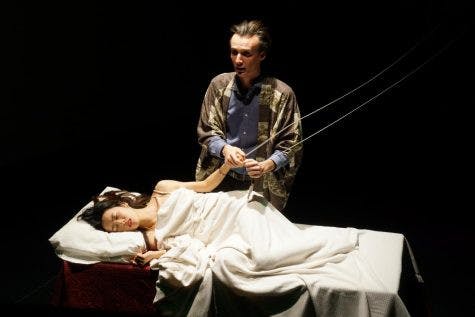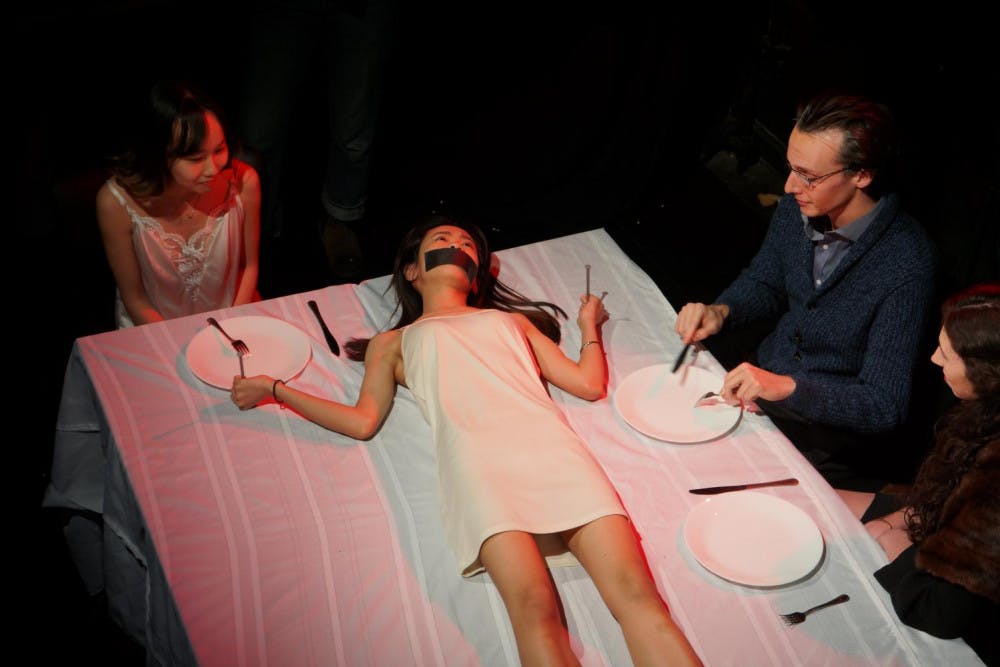Leo Tolstoy lacked a firm definition for his seminal work, “War and Peace.”
“It is not a novel, still less an epic poem, still less a historical chronicle,” wrote the Russian author. “‘War and Peace’ is what the author wanted and was able to express, in the form in which it is expressed.”
Tolstoy’s words aptly describe the enigmatic film-theater mashup of “Winter’s Cocoon,” the senior thesis project of Sabina Jiang ’18.5. The last showing of “Winter’s Cocoon,” which ran January 24 through 27 at the Hepburn Zoo, zigzagged fluidly through its duo medians.
The play tells the story of Ida (Yachao Dai ’21), a young actress who begins a love affair with a big-shot film director, Will (Nick Jaccaci ’22). Ida’s dreams reveal an alter-ego: Tina (Linh Tran ’22), also a young actress, who represents Ida’s latent insecurities. Eventually, these vignette-reveries become more violent and unsettling, especially when it is revealed that Will is married to a femme fatale insect enthusiast, Christine (Amanda Whiteley ’19). By the end of “Winter’s Cocoon,” the characters Ida and Tina both go from controlled victims to avenging Valkyries, wreaking comeuppance upon all who have done them wrong.
Jiang used both the screen and stage to tell a complex narrative through the relatively unexplored genre of the dream-based-May-December-romance-revenge-thriller-psycho-drama. From decorating a washing machine with Christmas lights to layering a room with used latex gloves and bloodied scissors, the director began with the macabre lever at a solid eleven, and turned it up higher and higher with every shocking twist.
“A dream is a jarring experience,” Jiang said. “You are suddenly punched by someone; suddenly someone is chasing you. At a certain point, you just give in.”
This deliberate mysteriousness allowed for some scenes to become darkly comedic. For instance, two chase scenes in the play involved an imaginary fish-headed man who craves “sushi and ketchup,” a delusion that might have had even Sigmund Freud drop a cigar in bewilderment.
The play’s venue often transformed. At one point in the production, the audience followed the cast out of the performance space into Hepburn’s basement and were also encouraged to interact with the actors.
The program even gave advice to the audience on how to fully appreciate “Cocoon.” In perfect alignment with the show’s eeriness, the instructions were from the protagonist’s perspective: “You are all free in my dream. You can move around, watch from anywhere … If you hear dance music, you DANCE.”
Across the board, the cast was stellar. Jaccaci took dramatic risks to play a seedy and emotionally manipulative Hollywood filmmaker, leering at the camera in all the filmed scenes and snarling at the audience in the play.
Jaccaci reflected on his role that “[Will] represents the worst of the worst in the entertainment industry.”

In an unsettling scene, Will appears to play Ida like a stringed puppet.
In a smaller but equally great performance, Whiteley played the Scylla to Jaccaci’s Charybdis, taking on the role of his wife Christine. Striding across the stage in a Cruella de Vil-style outfit while condescending to the Asian-American protagonist with racial jabs, the role of Christine acted as a great commentary on the bigotry that still lingers in the entertainment industry today.
As the dialogue became thornier and tensions ran higher, Whiteley’s Lady Macbeth-esque antagonist displayed a nefarious cool whenever on stage.
Yanchao Dai powerfully portrayed the young actress, Ida. Her every look combined numerous emotions: grief and horror when her character was strapped to a dinner table and gagged, but also dominance and power in the blood-soaked third act. Ida’s imaginary alter-ego, Tina, was also characterized with sensitivity by Linh Tran.
Jiang laughed when talking about the violence in her play: “Out of the plays and short films I have done, on the prop list there is always fake blood. I do not go into filming planning this, but it’s always red and there’s always blood.”
She said, “We are all very aware of how the violence could be misunderstood.”
The actor made the distinction that several of the murders in the play were with a “finger-gun,” implying a level of allegory to the violence rather than the realization of it; the play’s gore was more in the spirit of ‘Mulholland Drive,’ less ‘Reservoir Dogs.’
When asked about her plans after leaving Middlebury, Jiang said that she does not want to work in Hollywood, but would like to continue some sort of acting path.
“You have to work in a place where you feel needed,” Jiang said.
What exactly is “Winter’s Cocoon?”
The director smiled: “I think it belongs to experimental theater, maybe immersive theater … One of my goals for theater is for people not to walk out of the play and say, ‘Hah! I’ve got this!’”
Experimental Film-Theater Thesis Entrances Audiences

COURTESY PHOTO
Ida is gagged and strapped to the dinner table while her alter ego Tina responds to Will’s and Christine’s microaggressions over dinner.
Ida is gagged and strapped to the dinner table while her alter ego Tina responds to Will’s and Christine’s microaggressions over dinner.
COURTESY PHOTO
Comments



